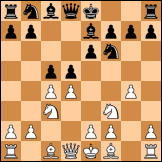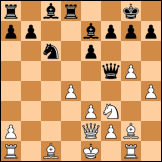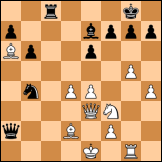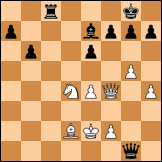Monday, November 24, 2008
One To Remember
I'm very pleased with the game I played last Thursday night against IM Renato Naranja. There are plenty of mistakes by both sides, but it was a good fighting game. And I got to offer sacrifices of both Rooks. And sac a Bishop at the end. And it's not another member of the "almost a good game except I screwed it up at the end" club.
As I said, lots of mistakes, but it's a game I'll remember.
Tuesday, November 18, 2008
A Good Draw
Here's another nice game of mine from the Marshall Championship. My opponent is a strong young master who--I'm told--is something of a theoretical expert on the opening variation in this game.
I was pretty happy to have held the draw, but it was the kind of game where losing wouldn't bother me unless it was because of some gross blunder. I found the middlegame fascinating.
In the comments to this post by Temposchlucker, I've been discussing pawn-up endgames where the superior side should avoid trading certain pieces. There's an example at move 30 of this game; White would be much better off if Black couldn't force the Queens off.
Monday, November 10, 2008
My Best Game From The Marshall Championship
To start clearing my backlog, here's my most fun game from the Marshall Championship. My opponent was a pleasant young fellow who recently wrote an engaging article for Chess Life about his struggle to get his rating over 2200. (Here's a popup javascript viewer of the game.)
White: NM Evan Rosenberg
Black: NM Ed Gaillard
1.d4 Nf6 2.c4 e6 3.Nc3 d5 4.Nf3 Be7 5.g4?!
after 5. g4?!
Surprise!
I think this is advocated in one of those books on surprise lines- _Secrets of Opening Stupidity_ or _Dangerous Boomerangs: 1.d4 d5_ or something of that ilk.
5...c5
9 minutes. It seemed right to play a Semi-Tarrasch with g4 in for White.
6.g5 Ne4 7.cxd5 Nxc3 8.bxc3 Qxd5 9.Rg1?!
Despite the airyness of the Kingside, White should probably play 9.Bg2 and O-O. Then Black is only slightly better.
9...cxd4
16 minutes. Decided I wanted as many open lines as possible with his King permanently in the center; 9...Nc6 10.Bg2 cxd4 11.Nxd4! is not exactly "good" for White, but seems less awful. However, there may have been a slight flaw in my reasoning.
10.cxd4
10.Qxd4 was probably an improvement (though still -/+); this is why 9...Nc6 was possibly more accurate.
10...Nc6 11.Bg2 O-O 12.h4?
He spent 12 minutes, and was only 5 minutes ahead of me on the clock. This is "pseudo-agressive"; what is White going to do, deliver mate on the g-file? Developing some pieces might be a good idea.
12...Rd8 13.e3 Qf5
10 minutes. 13...Qc4 14.Bf1 didn't seem to lead anywhere special.
14.Qe2
after 14.Qe2
Wait a second...
14...Nb4
9 minutes, leaving 58. I had a sudden turn--I realized I hadn't considered 15.Ne5 in response (only e4 and Bd2), so I had to work that out (decided on 15...Qc2 in that case)
15.e4 (15 minutes, leaving 1 hr 5 minutes.) 15...Qa5 16.Bd2 b6
only 3 minutes on this move. 16...Nc2+ is also very strong, perhaps better than this.
17.Rc1 (24 minutes, leaving 41.) 17...Ba6 (6 minutes. I think I was, ah, away from the board.) 18.Qe3 Qxa2
11 minutes, ...Rac8 being the main alternative.
19.Bf1 (7 minutes, 34 left.) 19...Rac8 (4 minutes, 34 left.) 20.Rxc8 Rxc8
Played quickly; Crafty really likes ...Bxc8., which never crossed my mind.
21.Bxa6
after 21.Bxa6
Time to work it out
Ah, I had forgotten that the Rook was going to be loose if I won the Queen. I took 18 minutes, leaving 16, and worked out what I thought was a clearer win. Gratifyingly, Crafty seems to agree with my analysis.
21...Qa1+ 22.Ke2 Qxa6+ 23.Kd1 Qa4+ 24.Ke2 Qb5+ 25.Kd1 Nc2 26.Qf4 Qb1+ 27.Ke2 (6 minutes for him, leaving 19.) 27...Qb5+ 28.Kd1 Qb1+ 29.Ke2 Nxd4+ 30.Nxd4 Qxg1
after 30...Qxg1
Aftermath
And there we are. (I calculated this before 21...Qa1+.)
31.Nf3 Qa1 32.Ne5 Rf8
32....f6 is simpler.
33.Nd7 Rd8 (3 minutes, leaving 7.) 34.Ne5 Rf8 35.Nd7 e5
This pretty much ends White's counterplay.
36.Qg3 Rd8 37.Nxe5 Bd6 38.Bc3
I was actually rocked by this, but it appears it only took me a minute (of my 4 remaining) to work it out. (If the mating line weren't there, 38...Qa4 is also easily winning.)
38...Bxe5 39.Qxe5 Qd1+ 40.Ke3 Rd3+ 0-1
Monday, November 03, 2008
Winning Out-Of-Repertoire
Just got back from a few days in Montreal. I have a bunch of games to post--I made an even score in the Marshall Chess Club Championship, with a nice win against a Master; two of my three losses were against IMs.
First, a game from a couple of weeks back, my last-round win in the Marshall Thursday Night tournament. It's a positive example of going out of my usual repertoire.
I've posted several negative examples of deliberately going out of repertoire in the past and had another one in the Championship, but this time it worked. The differences this time: I had White, and White can get away with more, and I chose something rather solid.